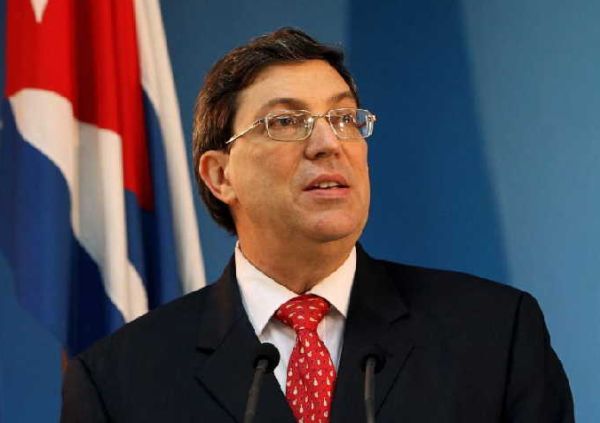It would seem paradoxical for a country that has never aspired to be in these events, at which it tries to command the power that imposes an economic, financial and commercial blockade on Cuba with more than 60 years and billions-worth in damages, with hard effects on the population.
That is the opinion in Havana, although Cuban authorities think that they could contribute this time to current issues, such as those related to the fight against Covid-19 and the migratory situation in the region.
The statement was made on Monday by Foreign Minister Bruno Rodriguez, who denounced before national and foreign media accredited here Washington’s maneuvers to separate Cuba from the Pan-American invitation.
In his opinion, the United States exerts extreme pressures on many countries in the region that favor the participation of Cuba.
Can anyone think of anything more antidemocratic? The head of Cuban diplomacy wondered.
Rodriguez also pointed out that Cuba should be taken into consideration in the elaboration of a Pan-American health strategy.
He said this in view of what he described as opaque, with neoliberal elements and many shortcomings in the negotiations on a healthcare and resilience plan for the Americas until 2030, in view of the summit agreed for California.
According to the Cuban foreign minister, such negotiations are taking place in the dark, with the exclusion of his country and other members of the Pan- American Health Organization (PAHO).
It seems strange because PAHO, together with the World Health Organization (WHO), will have to assess the effectiveness of Cuba’s homegrown vaccine, Abdala, which was the first of three vaccines that were certified in Cuba for the same purpose.
The head of the Cuban diplomacy excelled in presenting an arsenal of arguments that support how much his country could help in the articulation of a hemispheric strategy on health care and with a view to 2030.
The medical brigades deployed during the pandemic in more than 50 countries, the vaccines against Covid-19, medical assistance in countries damaged by natural disasters and epidemics are from Cuba, Bruno Rodriguez emphasized.
Thousands of scholarships granted to low-income young people from the continent and from the United States at the Latin American School of Medicine (ELAM) are also from Cuba, he added.
He mentioned Operation Miracle, which restored the vision of thousands of people, and the Cuban capacity to transfer technology, vaccines, protocols and treatments, all of which should be taken into account when defining hemispheric health policies.
In his press conference, the foreign minister quantified that the damages caused by the United States to Cuba for more than 60 years of economic, commercial and financial blockade amount to 150.41 billion dollars.
He added that such losses amount to more than one trillion dollars when the depreciation of the dollar against the value of gold in the international market is taken into account.
That is more than 12 million dollars a day and more than 365 million dollars a month to the detriment of a small and underdeveloped economy like Cuba’s, he said.
The blockade against Cuba is an uncomfortable subject for the executor of this practice and host of the Summit of the Americas, since it is a policy that has arisen broad continental and world rejection.
Rodriguez denounced that the blockade against his country has exerts hardships on the population and encourages emigration, one of the issues on the agenda of the summit in Los Angeles.
Cuba would have much to say about this and Rodriguez described US immigration policy as selective and discriminatory.
Washington reinforces the blockade and at the same time prevents Cubans from traveling, cuts off the channels for regular and orderly emigration and fails to comply with agreements by which it committed itself to grant no less than 20,000 immigrant visas to Cuban citizens every year, he remarked.
At another issue, he rejected the negotiation of a document on migration behind the back of international public opinion, which the White House intends to impose at the summit, he noted.
It is about, he said, forcing Latin American states to repress migration and absorb the migrants that the United States rejects, with a racist and xenophobic vision. This is a position that the government of President Joe Biden would not want to hear in Los Angeles.
 Escambray ENGLISH EDITION
Escambray ENGLISH EDITION





Escambray reserves the right to publish comments.